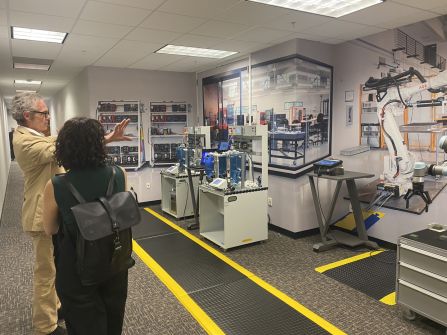
In September 2024 The Clean Economy Bridge went to Atlanta, Georgia to speak to leaders in the state’s clean economy transition. TCB Leads Toby Bernstein and Mary Hellmich spoke with representatives from the Georgia Public Service Commission, Georgia Quick Start and the Council of State Governments South, as well as staff and administration from the Georgia Institute of Technology.
The tour took a deep dive into Georgia’s activities in the clean economy space. Together with Georgia Tech, and with funding from the Environmental Protection Agency’s Climate Pollution Reduction Grant, the state Department of Natural Resources’ Environmental Protection Division created the state's first climate action plan: the Peach State Voluntary Emission Reduction Plan. The plan identifies the following emission reduction strategies and measures:
- Electrify the transportation sector and adapt to consumer mode shift
- Improve energy efficiency and promote electrification
- Increase the availability and use of renewable energy
- Improve waste diversion and landfill management
- Promote the use of alternative fuels
- Refrigerant management
- Advance conservation and sustainable land use
The clean energy sector has also kicked into high gear in Georgia, especially in solar and electric vehicle battery manufacturing. The state is ranked second in the country for clean energy projects, which have spurred over $23 billion in investment and created almost 30,000 good-paying jobs. In Georgia’s low-income communities, companies have announced $1.81 billion in investment and the creation of 3,515 clean energy jobs, while Georgia’s rural communities have seen project announcements totaling $1.88 billion in investment and 3,724 jobs. This green manufacturing boom looks like it is in Georgia to stay, along with the trending increase in renewable energy. Installed solar PV is growing rapidly, with nearly 4000MW installed as of 2022 and expected growth to put them at nearly 8000mw by 2026. However, there is room for growth on the personal adoption of technologies like electric vehicles and small-scale solar.
Georgia offers an excellent business environment for this green growth, with state-supported offers ranging from first scopings to training technical staff and incentives makes doing non-extractive and sustainable business that creates jobs for Georgians possible and very competitive. Collaboration and innovation also play a crucial role underpinning the growth of manufacturing and a steady adoption of green solutions, something TCB saw first-hand at Georgia Institute of Technology’s Kendeda building, the first "living building" in Georgia.
The clean economy is skyrocketing in Georgia. With billions in green investments pouring into the state, it looks like engagement on this topic is here to stay in the state. For the transatlantic relationship, engaging on adding renewables to the electricity mix and electric vehicle infrastructure are fertile ground for sustained cooperation.
